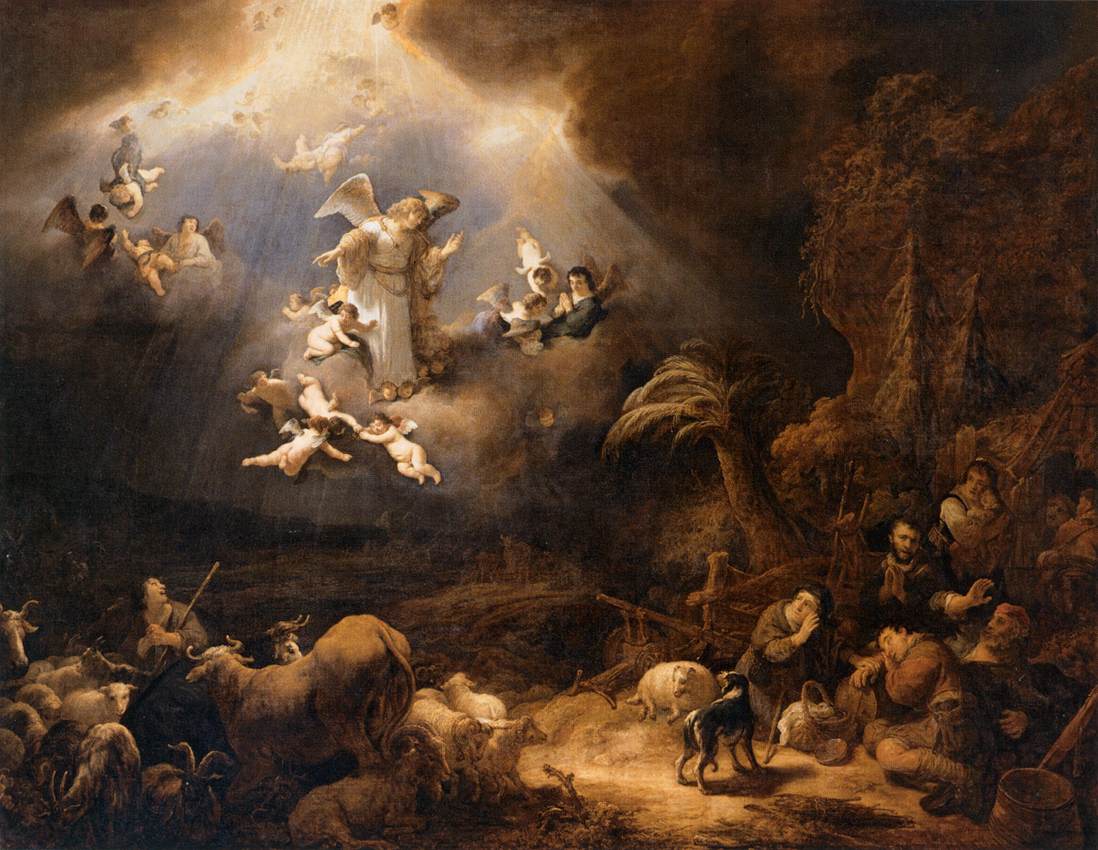So, we’re most of the way through Advent* (I know, it’s gone by incredibly fast — if you want to slow it down, try fasting). It seems like a good time to pause and reflect on the new translation of the Mass that was rolled out on the first Sunday of Advent. What’s changed, and why?
 |
| Giovanni Battista Tiepolo, Pope St. Clement Adoring the Trinity (c. 1738) |
To understand this, you first need to recognize that we’re part of something much bigger than ourselves. We too easily get caught up in the here and the now. The Church wisely resists this temptation. She strives to remind us in worship that we’re part of something much larger that ourselves, both global and timeless. This is the model of New Testament worship laid out in Scripture, in which people join in praise of God “from the rising to the setting of the sun” (Malachi 1:11).
Part of the reason we’re constantly reminded that we’re part of something much bigger than ourselves is that it resists the temptation to make the Mass about us, rather than about God. So in addition to being global and timeless, the Mass should also be transcendent. It should raise our spirits. But to do this, it must also be accessible. The perfect prayer is no good if I have no idea what I’m saying, or what it means. The Church took this question very seriously at the Second Vatican Council. How do we make the Mass accessible to individual believers throughout the world, while reminding us that we’re part of something larger than ourselves?
Here’s the solution She laid out in paragraph 36 of Sacrosanctum Concilium:
2. But since the use of the mother tongue, whether in the Mass, the administration of the sacraments, or other parts of the liturgy, frequently may be of great advantage to the people, the limits of its employment may be extended. This will apply in the first place to the readings and directives, and to some of the prayers and chants, according to the regulations on this matter to be laid down separately in subsequent chapters.
3. These norms being observed, it is for the competent territorial ecclesiastical authority mentioned in Art. 22, 2, to decide whether, and to what extent, the vernacular language is to be used; their decrees are to be approved, that is, confirmed, by the Apostolic See. And, whenever it seems to be called for, this authority is to consult with bishops of neighboring regions which have the same language.
4. Translations from the Latin text into the mother tongue intended for use in the liturgy must be approved by the competent territorial ecclesiastical authority mentioned above.
- The most obvious change is that when the priest says, “The Lord be with you,” we now say “And with your spirit,” instead of “And also with you.” This is (a) more faithful to the Latin (et cum spiritu tuo), (b) harmonious with what the rest of the Church is praying (for example any Masses celebrated in Spanish, (c) drawn from Scripture (Galatians 6:18; Philippians 4:23; 2 Timothy 4:22; Philemon 1:25), and (d) a recognition that the Holy Spirit is working through the priest.
- In the Penitential Act (the Confiteor), we now say “I have greatly sinned,” instead of “I have sinned through my own fault.” That’s because the Latin uses the adverb “nimis,” meaning “very much.” We’re also back to saying, “through my fault, through my fault, through my most grievous fault,” in the Penitential Act. It’s a direct translation of “mea culpa, mea culpa, mea maxima culpa.” The old translation just skipped these words — it wasn’t that they translated them badly: they just omitted them outright. So the new version is objectively better as a translation. But it also deliberately reminds us our sinfulness and our need for redemption. Read Luke 7:41-47. It’s only when we realize the gravity of our sins that we realize the depth of God’s mercy, and can fully appreciate the gift of salvation, and respond in love.
- In the Gloria, we used to proclaim, “Glory to God in the highest, and peace to His people on earth.” It now ends “and on earth peace to people of good will.” It’s a minor change, intended to be more faithful to the angelic chorus in Luke 2:14.
- The second part of the Gloria is more radically changed, going from “Lord God, heavenly King, almighty God and Father, we worship you, we give you thanks, we praise you for your glory,” to “We praise you, we bless you, we adore you, we glorify you, we give you thanks for your great glory, Lord God, heavenly King, O God, almighty Father.” Remember that the Gloria is a hymn of praise. It’s effusive: it sounds like we’re singing a love poem to God, which is exactly what we’re doing. You’ll notice this trend throughout: the new Mass translation will often say the same thing in more than one way, in an outpouring of praise, reaching something of a crescendo. The new translation is also an accurate translation of the Latin, while the old omitted two of the five verbs, and switched the order around.
- The Gloria now refers to Jesus as the “Only Begotten Son,” instead of the “only Son of the Father.” We become sons and daughters of the Father through Christ (Romans 8:15), but Jesus is the only begotten Son (John 3:16). So the new translation is more theologically sound, and it’s also more faithful to the Latin (Fili Unigenite).
- After calling Him Fili Unigenite (“Only Begotten Son”), the Gloria declares Jesus Fílius Patris, or “Son of the Father.” The old translation omitted this title completely (or perhaps merged the two title together). The new translation restores it.
- One final point on the Gloria. Here’s what the new translation says (and what the Latin says):
“you take away the sins of the world, have mercy on us;
you take away the sins of the world, receive our prayer.
you are seated at the right hand of the Father, have mercy on us.”
We ask repeatedly for Christ’s mercy. Look at the tax collector Christ holds up as a model of prayer in Luke 18:13, or the man in Mark 10:47-48, or the men in Matthew 20:30-31: we’ve got something similar here. The old translation was more of a rewrite than a translation. It cut out the first half of line 2, cut out the second half of line 3, and then tacked the end of line 2 where the end of line 3 used to be (so that it read “you are seated at the right hand of the Father: receive our prayer,” a line appearing nowhere). It also now reads the “sins” of the world, rather than the “sin”: both versions find textual support in John 1:29, since there are differences between manuscripts. The new translation also foreshadows the Agnus Dei (“Lamb of God”) prayer that comes later. - At the Gospel, we now say, “Glory to you, O Lord.” The “O” is new, and is an added touch of reverence.
- The Nicene Creed is now prayed in the singular: “I believe,” rather than “We believe.” This was one of the changes I found most fascinating, because there are good arguments both way. The Creed was originally in the plural, because it the was the Council of Nicea’s statement of faith. But it entered the Mass through the Rite of Baptism, in which the candidate to be baptized would recite the Creed (in the singular) as a confession of his or her faith. We now pray the Creed in the singular to emphasize that these aren’t just the beliefs of the Catholic Church, but are things that each of us actually believe in. This is also how it is in the Latin (Credo), and throughout the rest of the world.
- We declare the Father Maker of “all things visible and invisible,” rather than “all that is seen and unseen.” It’s a reminder that God created both the material and the spiritual world. “Unseen” was an inaccurate word choice: as the USCCB’s commentary explains, “a child playing hide-and-seek may be unseen yet is still considered visible, whereas one’s guardian angel is indeed invisible by nature.”
- As with the Gloria, the Creed now refers to Jesus as the “Only Begotten Son of God,” instead of the “only Son of God.” See the note on # 5.
- Jesus is referred to as “consubstantial” with the Father, rather than “One in being.” This part of the Creed was included in the 4th century to explain that Jesus was of the same substance (homoousios), rather than a similar substance (homoiousios), as the Father. That sounds like a needless technical debate, but it’s the difference between Jesus being God, or being God-like. So the difference is huge, even if the words are similar. “Consubstantial” is a technical term that helps preserve this important distinction.
- There are a lot of other minor tweaks to the language of the Creed. Since this is our individual and collective declaration of Faith, it makes sense to have everyone saying the same thing (imagine if each member of Congress took a slightly different oath of office, for example). The only other one I want to point out is that where it we used to say, “We look for the resurrection of the dead,” we now say, “I look forward to the resurrection of the dead.” Bring it on! St. Paul describes our belief in the resurrection of the dead as part of our “hope in God” as Christians (Acts 24:15). It’s something we should look forward to eagerly: the promise of Heaven. If we’re living in dread fear of the Final Judgment, we’re probably not living right.
- During the Preface to the Eucharistic Prayers, when the priest says, “Let us give thanks to the Lord our God, we respond “it is right and just.” That’s exactly what the Latin says (“dignum et iustum est”), and what other languages say. We used to say “it is right to give Him thanks and praise.”
- The Sanctus used to begin “Holy, holy, holy Lord, God of power and might.” It’s now “Holy, Holy, Holy Lord God of hosts.” The imagery there is of an angelic army, as Luke 2:13 describes, and the sort that Jesus refers to as at His disposal in Matthew 26:53.
- When the priest holds the Host up after the Agnus Dei, he now declares, “Behold the Lamb of God, behold Him who takes away the sins of the world. Blessed are those called to the supper of the Lamb.” This is a bit different then the old translation, and incredibly theologically rich, weaving together Pilate’s words from John 19:5, John the Baptist’s words from John 1:29, and the angel’s words from Revelation 19:9. Our response echoes that of the centurion in Matthew 8:8, “Lord, I am not worthy that You should enter under my roof, but only say the word, and my soul shall be healed.” There are two changes. First, it used to say “I am not worthy to receive you,” but the new translation restores the parallel to Mt. 8:8. Second, it used to say, “only say the word, and I shall be healed.” The new translation clarifies that we’re seeking spiritual healing here, not bodily.
 |
| Paolo Veronese, Feast at the House of Simon (detail) (1570) |
 |
| Giovanni di Paolo, St Ansanus Baptizing (c. 1440s) |
 |
| Govert Flinck, Angels Announcing the Birth of Christ to the Shepherds (1639) |
 |
| Elizabeth Barrett Browning |
Elizabeth Barrett Browning, begins her beautiful Sonnet XLIII, by telling her husband, “How do I love thee? Let me count the ways.” So it is with the Bride of Christ. The language of the new translation bubbles up and overflows, as we tell God we love Him in a number of different ways: “We praise you, we bless you, we adore you, we glorify you, we give you thanks for your great glory, Lord God, heavenly King, O God, almighty Father.” This Advent, as we prepare for Christ, pay close attention to what we’re praying at Mass, and why. There are incredible depths to be explored there, and a world of beauty to be uncovered.
*I initially wrote, “Today marks the halfway point of Advent,” having badly miscalculated. Kudos to Tito Edwards for pointing this out in the comments (and rather politely, too!).




Have you explained your method to aspiring bloggers? How do you manage to post so much quality content? Its an impressive showing, particularly for someone who has a day job. Do you set aside a certain amount of time every day or do you just squeeze it into whatever free moment?
I have a feeling you are going to be unable to help normal human bloggers b/c of the disparity between your skill and theirs (could St. Thomas tell people how to write Summas?). Especially given these kind of comments on the web:
“Joe Heschmeyer pretty much just played Sudoku before the LSAT and got a 177. But he’s an odd case” http://www.net-benefits.net/showthread.php?t=11966
haaaaaaaaaaaaaaaa! that is the funniest comment to this blog that i’ve seen yet! love it…
In Christ
cary
I could be wrong, but re: point 3 with the gloria, doesn’t the old translation follow a Textus Receptus reading, over an Alexandrian text?
I could be wrong here, but we are at the 3/4 point of Advent aren’t we? We just had Gaudete Sunday because I see that I’ve lighted three of my four candles on my Advent wreath.
If I’m missing something, please explain. Could it be an ancient Jewish custom of counting the days that I am missing?
UdoCanis: Here’s my take on Joe – He doesn’t watch TV as far as I can tell. He loves what he writes about (obviously). He has mad critical thinking skills and appreciates organization and clarity. He really cares about his readers (as his patience and charity in the comments indicate). He also stays up too late and isn’t married with kids.
Joe honed his abilities doing competitive debate in high school and college (just like Archbishop Sheen). The quote about his LSAT preparation is actually from a message board about college debate that I didn’t know still existed.
I attended high school and college with Joe so I’ve been observing him for years (I was a senior when he was a freshmen). He still beguiles me. The more I see though, the more I like. We could do for some more “odd cases” like Joe.
Ha! UdoCanis, you can’t puff me up like that, or God will send Tito Edwards to humble me.
And no, Tito, I can’t claim any special Jewish custom here. Just my general inability to count. Here’s what happened: I remembered that since Christmas is on a Sunday this year, we’ve got the longest possible Advent, since it effectively makes the season five Sundays long. Mentally, I remembered this as 35 days, instead of 29 (four weeks plus one day, rather than four weeks plus one week).
The halfway point for my mythological hirty-five day Advent would be two-and-a-half weeks before Christmas. Nevermind the fact that we’re only one-and-a-half weeks out. That was actually a second entire math error. I don’t think NASA’s going to be hiring me anytime soon.
Finally, Daniel, I’m not sure if it’s Textus Receptus v. Alexandrian or not (it may well be), but I do know that there are differences in how different Bible translations render Luke 2:14. So for both #3, and the “sin / sins” for #7, I think it could go either way.
Having said that, the Latin is quite clear: “et in terra pax homínibus bonae voluntátis.” So I think it makes sense to translate it the way that they did. If you’ve got to make a choice with an ambiguous translation, at least side with Rome.
I.X.,
Joe
In regards to the big picture, weren’t the rights of “competent territorial ecclesiastical authority’ denied when ICEL was disbanded and work on the new translations was handed over to Vox Clara? Which was outside the jurisdiction or the local authority.
“So in addition to being global and timeless, the Mass should also be transcendent. It should raise our spirits. But to do this, it must also be accessible. The perfect prayer is no good if I have no idea what I’m saying, or what it means.”
I have to disagree, Joe. The Mass is the Perfect Prayer because it is the Mass, it doesn’t matter if we in the pews don’t understand it. The priest is offering the prayers and we are joining our intentions, pefect or imperfect, to the perfect prayer of the Mass that the priest offers on our behalf.
Secondly, I hear this a lot as I go to the TLM, that it “needs to be accessable” or that we “have to understand it.” Aside from this being a bit anthropocentric, I also find it doesn’t hold much water. We all have or use Missals with translations on the next page (provided by the parishes, the red booklets), and after doing it a while, you don’t need to have your nose in the book during the Gloria–you have it memorized after a few times.
Also, while Vatican II does say we can use vernacular for certain prayers or chants in the first place, it doesn’t say the whole thing has to be in the vernacular. In fact, the Council of Trent says “if anyone says that “the Mass ought to be celebrated in the vernacular tongue only” (lingua tantum vulgari), let him be anathema.” My emphasis, just to follow up with the need for accessibility, because what has happened is that the whole Mass, at least in America, is almost always solely in the vernacular.
Otherwise I agree with your post, the corrected translation is great, and the propers are really inspiring. I’m looking forward to the Mass of Pope Paul VI gaining more and more reverence universally in the American church.
Taylor,
I think you may be reading this as an attack on the Extraordinary Form of the Mass, which it wasn’t intended to be. I actually agree with much of what you’ve written here.
For example, you wrote, “Also, while Vatican II does say we can use vernacular for certain prayers or chants in the first place, it doesn’t say the whole thing has to be in the vernacular.” Agreed. I pointed that in the original post by quoting paragraph 38 of Sacrosanctum Concilium, which begins: “the use of the Latin language is to be preserved in the Latin rites,” before authorizing specific prayers in the vernacular. So it’s not just Trent that rejects an “always-vernacular” mindset. It’s also Vatican II.
But my broader point was that there should always be a concern for both transcendence and accessibility. If the Liturgy is like Jacob’s ladder, it needs to descend near enough to us that we can reach it (accessibility), but it needs to also lift us out of ourselves (transcendence). I don’t see what the counter-argument to that would be.
Even in the example you provided in your first comment, you’re presupposing that the priest understands what’s going on, and that the laity have at least a passing understanding. If there were no accessibility, the Mass wouldn’t even be a prayer: it’d be mindless incantation.
I don’t believe for a moment that the OF lacks all transcendence, or the EF lacks all accessibility. As you’ve noted, one way that an EF Mass might encourage accessibility is by providing missals with translations, so people have a better idea what it is they’re praying. And one way the OF Mass cultivates transcendence is through the new translations, so that we’re praising God more reverently. But whatever the form of the Liturgy, we still see that dual concern for both transcendence and accessibility.
I.X.,
Joe
I gotcha. Thanks Joe for all you do!
This may be a silly anecdote, but I’m glad you point out that it is a better translation. You could argue until the cows come home about what makes a good translation but ultimately it has to fulfil its purpose, and the old translation didn’t do that. It greatly reduced the transcendent aspect of the Mass and weakened Scriptural references, which is not helpful.
It was also extremely free for a translation. If I were to return a client a translation with the same level of “free-ness”, they would probably send it back due to its inaccuracy. The old translation wasn’t even particularly beautiful or elegant. Just very pedestrian and inaccurate. Deo gratias for the updated translation.
Hear, hear for the new translation! Aside from all the points you listed, my humble opinion of the new translations’ superiority is that its formal language 1) conveys the gravity and importance of the Mass, which is only appropriate and 2) I have to listen closely to the prayers because I don’t know them all by heart yet, which means I’m able to appreciate them; there are some truly beautiful passages in there! And of course, it offers us a teachable moment to explain this most important aspect of our faith to people who might have heard some hub-bub about it in the media.
In my [anecdotal] experience, my colleagues and friends in my age bracket embraced the changes either with excited zeal or simple acceptance; it is only the older generations who had to be dragged along kicking and screaming.
This is very helpful, thank you.
haha. But seriously, I think that at some point a blog post on blogging (a meta-post?) would be helpful to a lot of people, though I understand if you’d rather avoid the self-indulgence or whatever. What is amazing is that you not only post daily (which is amazing enough) but that you also effectively moderate a forum going on in the comments. An amazing amount of work and sacrifice for somebody not doing this for a living–which, by the way is a good reason to write a book (you’ve built up a market and advertising platform for it and deserve to be compensated). If I were you, I would be trying to monetize this ala Mark Shea. Why places like the NCR haven’t hired you yet is beyond me, but hopefully a book will prompt that.
Will blog for food… Haha I would pay up!
I am currently enrolled in RCIA, so please forgive me for resurrecting an old thread. The claim you make in (4) regarding the “second part of the Gloria” is false. The new form of this hymn is actually a poor translation, especially when it comes to “benedícimus te” being translated as “we bless you”. A better translation would be “we acknowledge that you are worthy of blessing”, “we desire that you be blessed [by us]”, or, simply, “bless you”. The phrase “we bless you” has very undesirable connotations in English—it amounts to a factual claim, namely, that God approves of or is impressed by our conduct. English-speaking Catholics not divinely assured of their impending sainthood should cringe when they sing this line as it is now rendered. Really, the addition of the personal pronoun “we” (which is not present in the Latin) in all five of these lines transforms what would otherwise be a series of God-directed oblations into an anthropocentric narrative. It is truly hideous.
Steven,
Glad to hear that you’re in RCIA – that’s wonderful!
The personal pronoun “we” doesn’t need to be added – the conjugation is the first-person-plural, which is why each of those verbs ends in -imus. It literally means “we bless you,” not “we acknowledge that you are worthy of blessing,” and I’m not aware of anyone who opts for the translation that you propose.
I’m also confused as to why you think “we bless you” means “that God approves of or is impressed by our conduct” in English. As an English speaker, I certainly don’t see a way to derive that, much less to derive a promise of my own Sainthood.
I.X.,
Joe